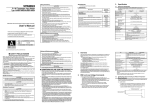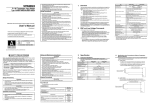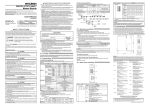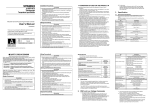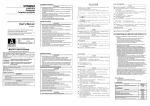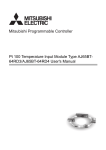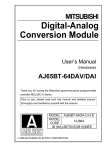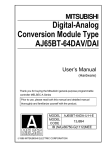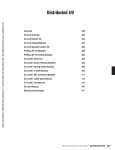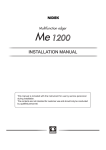Download User`s Manual
Transcript
[Wiring Precautions]
Pt 100 Temperature Input Module
Type AJ65BT-64RD3/AJ65BT-64RD4
Mitsubishi General-Purpose Programmable Controller
User’s Manual
(Hardware)
Thank you for purchasing the Mitsubishi general-purpose
programmable controller MELSEC-A series.
Prior to use, please read this manual thoroughly and
familiarize yourself with the product.
Type
AJ65BT64RD-U-HW-E
Type
13JL50
Code
IB (NA)-66831-G(1112) MEE
© 1996 MITSUBISHI ELECTRIC CORPORATION
zSAFETY PRECAUTIONSz
(Read these precautions before using this product.)
Before using this product, please read this manual and the relevant manuals
carefully and pay full attention to safety to handle the product correctly.
These precautions apply only to Mitsubishi equipment. Refer to the CPU module
user’s manual for a description of the programmable controller system safety
precautions.
In this manual, the safety precautions are classified into two levels:
" WARNING" and " CAUTION".
WARNING
CAUTION
Indicates that incorrect handling may cause hazardous
conditions, resulting in death or severe injury.
Indicates that incorrect handling may cause hazardous
conditions, resulting in minor or moderate injury or property
damage.
Under some circumstances, failure to observe the precautions given
under " CAUTION" may lead to serious consequences.
Observe the precautions of both levels because they are important for
personal and system safety.
Make sure that the end users read this manual and then keep the manual
in a safe place for future reference.
[Design Precautions]
WARNING
• In the case of a communication failure in the network, data in the master module
are held.
Check the communication status information (SB, SW) and configure an interlock
circuit in the sequence program to ensure that the entire system will operate safely.
CAUTION
• Do not install the control lines or communication cables together with the main
circuit lines or power cables.
Keep a distance of 100mm (3.94 inches) or more between them.
Failure to do so may result in malfunction due to noise.
[Installation Precautions]
CAUTION
• Use the module in an environment that meets the general specifications in this
manual.
Failure to do so may result in electric shock, fire, malfunction, or damage to or
deterioration of the product.
• For protection of the switches, do not remove the cushioning material before
installation.
• Securely fix the module with a DIN rail or mounting screws. Tighten the screws
within the specified torque range.
Undertightening can cause drop of the screw, short circuit or malfunction.
Overtightening can damage the screw and/or module, resulting in drop, short
circuit, or malfunction.
• Do not directly touch any conductive part of the module.
Doing so can cause malfunction or failure of the module.
[Wiring Precautions]
CAUTION
• Shut off the external power supply for the system in all phases before wiring.
Failure to do so may result in damage to the product.
• After installation or wiring, attach the included terminal cover to the module before
turning it on for operation.
Undertightening can cause short circuit or malfunction.
• Ground the FG terminals to the protective ground conductor dedicated to the
programmable controller.
Failure to do so may result in malfunction.
• Use applicable solderless terminals and tighten them within the specified torque
range. If any spade solderless terminal is used, it may be disconnected when the
terminal screw comes loose, resulting in failure.
• Check the rated voltage and terminal layout before wiring to the module, and
connect the cables correctly.
Connecting a power supply with a different voltage rating or incorrect wiring may
cause a fire or failure.
CAUTION
• Tighten the terminal screw within the specified torque range.
Undertightening can cause short circuit or malfunction.
Overtightening can damage the screw and/or module, resulting in drop, short circuit, or
malfunction.
• Prevent foreign matter such as dust or wire chips from entering the module.
Such foreign matter can cause a fire, failure, or malfunction.
• Place the cables in a duct or clamp them.
If not, dangling cable may swing or inadvertently be pulled, resulting in damage to the
module or cables or malfunction due to poor contact.
• Do not install the control lines or communication cables together with the main circuit
lines or power cables. Failure to do so may result in malfunction due to noise.
• When disconnecting the cable from the module, do not pull the cable by the cable part.
Loosen the screws of connector before disconnecting the cable.
Failure to do so may result in damage to the module or cable or malfunction due to
poor contact.
[Startup and Maintenance precautions]
CAUTION
• Do not touch any terminal while power is on.
Doing so may cause malfunction.
• Shut off the external power supply for the system in all phases before cleaning the
module or retightening the terminal screws.
Failure to do so may cause the module to fail or malfunction.
Undertightening the terminal screws can cause short circuit or malfunction.
Overtightening can damage the screw and/or module, resulting in drop, short circuit, or
malfunction.
• Do not disassemble or modify the modules.
Doing so may cause failure, malfunction, injury or a fire.
• Do not drop or apply any strong shock to the module.
Doing so may damage the module.
• Shut off the external power supply for the system in all phases before mounting or
removing the module to or from the panel.
Failure to do so may cause the module to fail or malfunction.
• Mounting/removing the terminal block is limited to 50 times after using a product.
(IEC61131-2-compliant)
• Do not remove or change the platinum temperature-measuring resistor designation pin
while energizing the module.
If a platinum temperature-measuring resistor designation pin is removed or changed
while energizing, it may cause failure or malfunction.
• Before handling the module, touch a grounded metal object to discharge the static
electricity from the human body.
Failure to do so may cause the module to fail or malfunction.
[Disposal Precautions]
CAUTION
• When disposing of this product, treat it as industrial waste.
zCONDITIONS OF USE FOR THE PRODUCTz
(1) Mitsubishi programmable controller ("the PRODUCT") shall be used in conditions;
i) where any problem, fault or failure occurring in the PRODUCT, if any, shall not
lead to any major or serious accident; and
ii) where the backup and fail-safe function are systematically or automatically
provided outside of the PRODUCT for the case of any problem, fault or failure
occurring in the PRODUCT.
(2) The PRODUCT has been designed and manufactured for the purpose of being
used in general industries.
MITSUBISHI SHALL HAVE NO RESPONSIBILITY OR LIABILITY (INCLUDING,
BUT NOT LIMITED TO ANY AND ALL RESPONSIBILITY OR LIABILITY BASED
ON CONTRACT, WARRANTY, TORT, PRODUCT LIABILITY) FOR ANY
INJURY OR DEATH TO PERSONS OR LOSS OR DAMAGE TO PROPERTY
CAUSED BY the PRODUCT THAT ARE OPERATED OR USED IN
APPLICATION NOT INTENDED OR EXCLUDED BY INSTRUCTIONS,
PRECAUTIONS, OR WARNING CONTAINED IN MITSUBISHI'S USER,
INSTRUCTION AND/OR SAFETY MANUALS, TECHNICAL BULLETINS AND
GUIDELINES FOR the PRODUCT.
("Prohibited Application")
Prohibited Applications include, but not limited to, the use of the PRODUCT in;
y Nuclear Power Plants and any other power plants operated by Power
companies, and/or any other cases in which the public could be affected if any
problem or fault occurs in the PRODUCT.
y Railway companies or Public service purposes, and/or any other cases in which
establishment of a special quality assurance system is required by the
Purchaser or End User.
y Aircraft or Aerospace, Medical applications, Train equipment, transport
equipment such as Elevator and Escalator, Incineration and Fuel devices,
Vehicles, Manned transportation, Equipment for Recreation and Amusement,
and Safety devices, handling of Nuclear or Hazardous Materials or Chemicals,
Mining and Drilling, and/or other applications where there is a significant risk of
injury to the public or property.
Notwithstanding the above, restrictions Mitsubishi may in its sole discretion,
authorize use of the PRODUCT in one or more of the Prohibited Applications,
provided that the usage of the PRODUCT is limited only for the specific
applications agreed to by Mitsubishi and provided further that no special quality
assurance or fail-safe, redundant or other safety features which exceed the
general specifications of the PRODUCTs are required. For details, please contact
the Mitsubishi representative in your region.
About Manuals
The following product manuals are available.
Detailed Manual
Manual Name
Pt 100 Temperature Input Module Type AJ65BT-64RD3/AJ65BT-64RD4
User's Manual
Manual No.
(Model Code)
SH-4001
(13JL54)
Related Manual
Manual Name
CC-Link System Master/Local Module Type AJ61BT11/A1SJ61BT11
User's Manual
CC-Link System Master/Local Module Type AJ61QBT11/A1SJ61QBT11
User's Manual
CC-Link System Master/Local Module User's Manual type QJ61BT11N
Type AnSHCPU/AnACPU/AnUCPU/QCPU-A (A Mode) Programming
Manual (Dedicated Instructions)
MELSEC-L CC-Link System Master/Local Module User’s Manual
Manual No.
(Model Code)
IB-66721
(13J872)
IB-66722
(13J873)
SH-080394E
(13JR64)
IB-66251
(13J742)
SH-080895ENG
(13JZ41)
1. Overview
This user's manual explains the specifications, part identification and wiring for the
products listed below, which are used as remote device stations for the CC-Link
system:
y AJ65BT-64RD3 Platinum Temperature-Measuring Resistor Pt 100 Temperature
Input Module (abbreviated as AJ65BT-64RD3 from here on)
y AJ65BT-64RD4 Platinum Temperature-Measuring Resistor Pt 100 Temperature
Input Module (abbreviated as AJ65BT-64RD4 from here on)
The AJ65BT-64RD3 is a 3-wire system connecting module for the platinum
temperature-measuring resistor.
The AJ65BT-64RD4 is a 4-wire system connecting module for the platinum
temperature-measuring resistor.
(Hereinafter, the AJ65BT-64RD3 and AJ65BT-64RD4 will be collectively referred to
as AJ65BT-64RD.)
The AJ65BT-64RD converts temperature data input from platinum temperaturemeasuring resistor Pt 100 (abbreviated as Pt 100 from here on) or platinum
temperature-measuring resistor JPt 100 (abbreviated as JPt 100 from here on) to 16bit signed BIN data (up to the first decimal place), or 32-bit signed BIN data (up to the
third decimal place).
2. EMC and Low-Voltage Commands
(1) Method of ensuring compliance
To ensure that Mitsubishi programmable controllers maintain EMC and Low
Voltage Directives when incorporated into other machinery or equipment, certain
measures may be necessary. Please refer to one of the following manuals.
y User's manual for the CPU module or head module used
y Safety Guidelines
(This manual is included with the CPU module, base unit, or head module)
The CE mark on the side of the programmable controller indicates compliance
with EMC and Low Voltage Directives.
(2) Additional measures
To ensure that this product maintains EMC and Low Voltage Directives, please
refer to one of the manuals listed under (1).
Temperature detection
value
Operating ambient
temperature
(25 ± 5 °C)
Overall
Operating
ambient
accuracy
temperature (less
than 20 °C, more
than 30 °C)
Resolution
Conversion speed
(Sampling time)
Temperature input point
CC-Link station type
AJ65BT-64RD3
3-wire
AJ65BT-64RD4
4-wire
Pt 100, JPt 100
4. Name of Each Part
1 mA
–180 to 600°C
16-bit signed binary : –1800 to 6000
(value to one decimal place × 10)
32-bit signed binary : –180000 to 600000
(value to three decimal places × 1000)
The name of each part in the AJ65BT-64RD is described.
2)
MITSUBISHI
± 0.1 % (accuracy for maximum value)
B RATE STATION NO.
X10
X1
MELSEC A J65BT-64RD
SW
0
1-4
9
MODE
NORMAL
TEST CH.
TEST
9) (Side face)
1)
PW
RUN
L RUN
SD
RD
L ERR.
01
2
3
4
01
901
2 8
2
3 7
3
654
654
MODE OFFSET UP
901
2
3
4
± 0.25 % (accuracy for maximum value)
RESET
SET
GAIN DOWN
9.5
(0.37)
JPt 100 Pt 100
63 (2.48)
Item
Measurement method
Connectable platinum
temperature-measuring
resistor
Output current for detecting
temperature
Temperature input range
6.2 Precautions when Wiring
To obtain maximum performance from the functions of AJ65BT-64RD and
improve the system reliability, a wiring with high durability against noise is
required.
The following describes the external wiring precautions.
(1) Use separate cables for the AC and the external input signals of the AJ65BT64RD, in order not to be affected by the AC side surge or conductivity.
(2) Always place a platinum temperature-measuring resistor at least 10 cm (3.9 in.)
apart from the main circuit line and AC control circuit line. Place a platinum
temperature-measuring resistor sufficiently apart from circuits with high
frequency, such as high-voltage lines and inverter load main circuits. If they are
placed close to each other, the platinum temperature-measuring resistor is
influenced more easily by the noise, surge, or conductivity.
NP
2- ø4.5 installing hole
MITSUBISHI
B RATE STATION NO.
X10
X1
MELSEC AJ65BT-64RD
6.3 Connecting to the AJ65BT-64RD3
SW
0
1-4
9
(1) The highest accuracy can be obtained if a 3-wire type platinum temperaturemeasuring resistor is used for AJ65BT-64RD3.
The following shows a connection example of a 3-wire type platinum
temperature-measuring resistor.
MODE
NORMAL
TEST CH.
TEST
PW
RUN
L RUN
SD
RD
L ERR.
01
2
3
4
01
901
2 8
2
3 7
3
6 54
654
MODE OFFSET UP
9 01
2
3
4
SET
GAIN DOWN
RESET
56 (2.2)
3.1 Performance Specification
The performance specification of the AJ65BT-64RD is shown below.
And, refer to master module user's manual which is used about the general
specification.
7. External Dimensions Diagram
3.3 Applicable Systems
The CC-Link system master modules that the AJ65BT-64RD can use are
explained below.
y There are no restrictions when using the Q series master modules (QJ61BT11N,
QJ61BT11).
y When using the Q series master modules (AJ61QBT11, A1SJ61QBT11), use one
where the symbol shown below (9707 B or later) is recorded in the DATE column
on the rating name plate. The master modules that do not have "9707 B" recorded
on the DATE column cannot be used.
65 (2.56)
3. Specification
0.025°C
142.9 (5.63)
40 ms/channel*1
4-channel/module
Remote device station
4-station : RX/RY
128 points each
Occupied points
RWw/RWr
16 points each
Connection cable
CC-Link dedicated cable
Between batch power supply system and ground
Between batch power supply system and batch communication
system
Dielectric withstand voltage
Between batch communication system and batch temperature input
Between batch temperature input and ground
500 V AC, 1 minute
Between the platinum temperature-measuring resistor input and CC-Link
transmission : photocoupler insulation
Insulation method
Between the platinum temperature-measuring resistor input and channel :
no insulation
Between batch power supply system and ground
Between batch power supply system and batch communication
system
Between batch communication system and batch temperature
Insulation resistor
input
Between batch temperature input and ground
500 V DC, more than 10 M Ω by the insulation resistance taster
Noise durability
Noise voltage 500 Vp-p, Noise width 1 μs by noise simulator of the
noise frequency 25 to 60 Hz
Connection terminal block
27 points terminal block (M 3.5 × 7 screws)
Supported cable size
0.75 to 2.00 mm2
Supported solderless terminal
RAV 1.25-3.5, RAV 2-3.5 (Conforms to JIS C2805)
Module mounting screw
M4 × 0.7 mm (0.03 in.) × 16 mm (0.63 in.)
Installation in the rail is possible, too.
Applicable DIN rail
TH35-7.5Fe, TH35-7.5Al, TH35-15Fe (conform to JIS C 2812)
External power supply
24 V DC (18 to 30 V DC)
Allowable momentary power
1 ms
failure period
Weight
0.38 (0.84) kg (lb.)
*1 Conversion speed is the time until it is converted to the corresponding digital value
after the temperature has been input, and then stored in the remote register.
When the multiple channels are used, the conversion speed is “40 ms × number
of the conversion enable channels
3.2 Specifications when Connecting to a Platinum TemperatureMeasuring Resistor
The following explains the specifications when connecting the AJ65BT-64RD
and a platinum temperature-measuring resistor.
(1) AJ65BT-64RD3
• The effect on the measured resistance by the discrepancy in the lead
resistance value connected to A, b is approximately 0.025 °C/10 m Ω.
• The lead resistance value between platinum temperature measuring resistor
and AJ65BT-64RD3 should be 100 Ω or less per line.
100 Ω or less per line
A
8)
Number
1)
2)
3)
4)
5)
6)
7)
8)
9)
7) 3) 4) 5) 6)
Name
Station setting switch
Transmission baud rate setting switch
MODE switch
OFFSET/GAIN (Offset/gain) setting switch
UP/DOWN switch
RESET switch
LED for operation status display PW
RUN
L RUN
SD
RD
L ERR.
Terminal block
Platinum temperature-measuring resistor type specification pin
5. Handling
151.9 (5.98)
Unit: mm (in.)
*1 May be better to connect depending on the operating environment.
(2) A 4-wire type or 2-wire type platinum temperature-measuring resistor can also be
used for AJ65BT-64RD3.
Connect as shown in the diagrams below when using a 4-wire type or 2-wire type
platinum temperature-measuring resistor.
4-wire type
2-wire type
5.1 Handling Precautions
(1) Because it is made of resin, do not drop or given a strong shock to the module
case and the terminal block.
(2) Do not take the printed circuit board of the module out of the case. It may result
in a failure.
(3) Be careful not to let foreign matter such as filings or wire chips get inside the
module while wiring. Remove all foreign matters if any get inside.
(4) Tighten the module mounting screws within the following torque range.
Screw area
Module mounting screws (M4 screw)
Terminal block terminal screws (M3.5 screw)
Terminal block mounting screws (M3.5 screw)
Tightening torque range
0.78 to 1.18 N · m
0.59 to 0.88 N · m
0.98 to 1.37 N · m
(5) When using a DIN rail adapter, install the DIN rail considering the precautions
described below.
(a) Applicable DIN rail types (conform to JIS C 2812)
TH 35-7.5 Fe
TH 35-7.5 Al
TH 35-15 Fe
(b) Space between DIN rail mounting screws
When installing a DIN rail, tighten the screws with a space of less than 200 mm
(7.9 in.).
A
A
B
B
b
b
SLD
SLD
WARRANTY
Mitsubishi will not be held liable for damage caused by factors found not to be the cause of
Mitsubishi; machine damage or lost profits caused by faults in the Mitsubishi products; damage,
secondary damage, accident compensation caused by special factors unpredictable by Mitsubishi;
damages to products other than Mitsubishi products; and to other duties.
6.4 Connecting to the AJ65BT-64RD4
(1) The highest accuracy can be obtained when if a 4-wire type platinum
temperature-measuring resistor is used for AJ65BT-64RD4. The following
shows a connection example of a connecting the 4-wire type platinum
temperature-measuring resistor.
6. Wiring
6.1 Wiring Example with CC-Link Module
Platinum temperaturemeasuring resistor
B
The twisted cable connections between the AJ65BT-64RD and master
module are as follows:
b
SLD
(2) AJ65BT-64RD4
The lead resistance value between between platinum temperature-measuring
resistor and AJ65BT-64RD4 should be 100 Ω or less per line.
*1 May be better to connect depending on the operating environment.
(2) A 4-wire type or 3-wire type platinum temperature-measuring resistor can also be
used for AJ65BT-64RD4.
Connect as shown in the diagrams below when using a 3-wire type or 2-wire type
platinum temperature-measuring resistor.
3-wire type
2-wire type
100 Ω or less per line
a
A
Point
Platinum temperaturemeasuring resistor
B
b
SLD
For the modules at both ends of the data link, make sure to connect the "terminal
resistor" that is attached to a master module (Connect between DA and DB).
a
a
A
A
B
B
b
b
SLD
SLD


